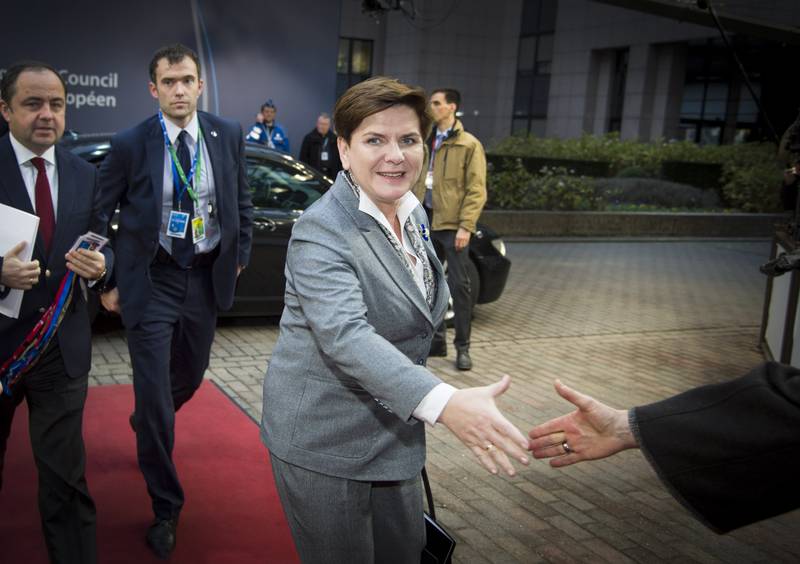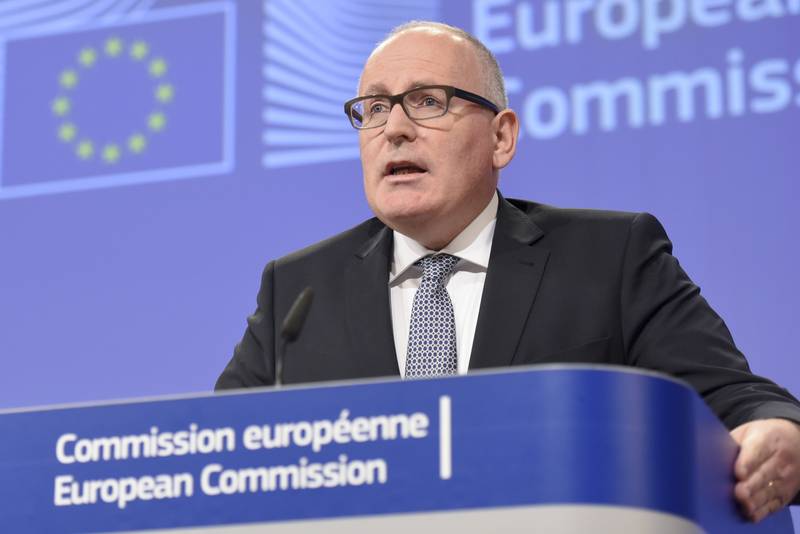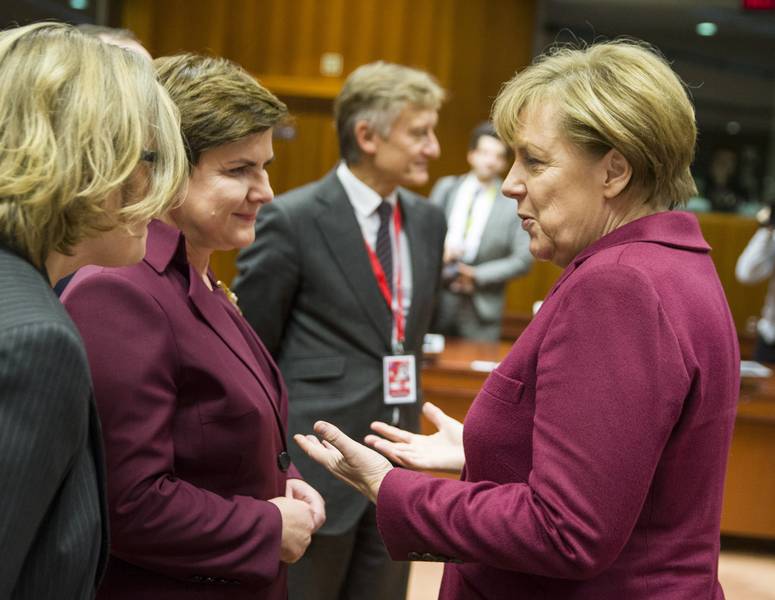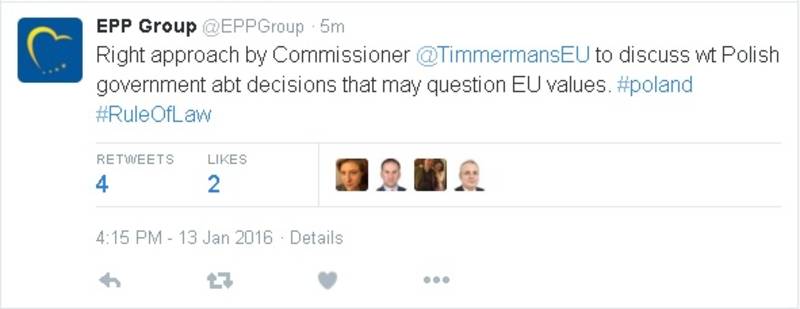European Commission Starts a Battle with Poland with Unknown Ending
Adelina Marini, January 14, 2016
 The European Commission took on the Poland challenge and announced it is going to investigate whether the reigning champion of Eastern Europe in the transition from totalitarian to democratic system is doing a U-turn. The EU has begun 2016 entering a Polish mode, which will put to the test the young Rule of Law Mechanism, degraded while it was still being built to a “Rule of Law Framework”. The framework is going to be used for the first time as euinside reported. Aside from expecting to see whether the framework is truly incapable of solving serious problems with one of the most important EU values – the rule of law – it is also to be seen whether the EC treats everybody as an equal under it and under European law.
The European Commission took on the Poland challenge and announced it is going to investigate whether the reigning champion of Eastern Europe in the transition from totalitarian to democratic system is doing a U-turn. The EU has begun 2016 entering a Polish mode, which will put to the test the young Rule of Law Mechanism, degraded while it was still being built to a “Rule of Law Framework”. The framework is going to be used for the first time as euinside reported. Aside from expecting to see whether the framework is truly incapable of solving serious problems with one of the most important EU values – the rule of law – it is also to be seen whether the EC treats everybody as an equal under it and under European law.
The Poland issue was the main topic of discussion on the agenda of the first meeting for the new year of the Commissioners’ College, main focus being on the Constitutional Tribunal changes. After the parliamentary elections in Poland last year, the new government made an impression that they had chosen the authoritarian approach of Hungarian Prime Minister Viktor Orbán, who began his term in office with radical changes of the laws concerning media, the judiciary, even laying a hand on the independence of the central bank. At that time, the EU did not yet have even as flimsy an instrument as the Rule of Law Framework, but the Commission reacted with media criticism, exchange of letters, and consultations. The European Parliament in turn organised hearings with PM Orbán appearing in person at several of them. The result is dubious. According to some (the EC itself among them), there is some result, for the problematic decisions have been considerably softened or withdrawn.
According to others, however, PM Orbán has walked away unpunished. So much so, that he dared announce several years later a course towards illiberal democracy, which was passed over by the European political establishment as a political eccentricity. The EC so far has only one successful case of solving rule of law problems in the new member states, most of which have totalitarian past. This is Romania, which was shaken back in 2012 by a heavy political crisis, which also included attempts to influence the Constitutional Tribunal. It must be noted though that Romania entered the EU with a Cooperation and Verification Mechanism, which monitors the Judiciary reform in the country as well as the battle against corruption at the high levels of power.
It was exactly this mechanism that inspired Commission Vice President at the time Viviane Reding (Luxembourg, EPP) to create a common European mechanism for battling the violations of the rule of law in all member states. As this website extensively reported, the mechanism was significantly trimmed due to fear that member states would dismiss it. But even the cut-out version was further weakened by the Council, which demoted it to an annual dialogue in the General Affairs Council.
The first step on the new framework provides for performing a preliminary assessment. This is exactly what the EC announced it was going to do after the Commissioners discussed the issue. According to First Vice President Frans Timmermans (The Netherlands, Socialists and Democrats), there was complete unanimity in the College to launch the procedure. The assessment will concentrate on the Constitutional Tribunal, for this is precisely where the EC sees threat to the rule of law, although it is admitted that media are the main pillar of democracy and thus – of the rule of law. The reasons are the questionable actions of the new Polish majority around the election of new members of the Constitutional Tribunal after their term ran out. According to the information the EC has, parliament had proposed that the president appointed five judges before the parliamentary elections scheduled for October 25th (on October 8th). Three of them were supposed to assume office during the term of  the previous parliament, and two to begin work after the new parliament’s term began on November 12th.
the previous parliament, and two to begin work after the new parliament’s term began on November 12th.
On November 19th, the new Sejm voted, using an accelerated procedure, amendments to the Constitutional Tribunal Law allowing for the annulment of nominations made by the previous parliament and reducing the term in office of the President and Vice-President of the Tribunal from nine years to three. On November 25th, the new Sejm annulled the five nominations and on December 2nd nominated five new judges. On December 3rd, the Tribunal ruled that the previous parliament had the right to nominate three judges for the seats vacated during its term, but had no right to make nominations for the seats that were to be vacated during the term of the new parliament. On December 9th, the Tribunal came out with a new ruling, according to which the new parliament was not entitled to annul the first three appointments, but had the right to make the new two. Meanwhile, however, the president had sworn in all five judges, nominated by the new parliament.
The story does not end here. On December 28th, new rules for the work of the Constitutional Tribunal got voted in which, according to the EC interpretation, hinder the Tribunal in checking the accordance with the Constitution of newly voted laws through the increase of the necessary majority from a simple majority to two-thirds. The EC on its own initiative immediately sent two letters to Polish authorities requesting clarification. One for the amendments concerning the Constitutional Tribunal and the other regarding the media law. Polish Minister of Justice Zbigniew Ziobro published in his Twitter account the contents of his reply to the first Frans Timmermans letter, which contains sharp criticism and accusations of leftism.
According to the justice minister, the new majority aimed the amendments at bringing back pluralism to the Constitutional Tribunal and reinstating the legal state. He accuses the Commission vice president of not paying attention to serious violations, committed by the previous parliament. The previous parliament did not adhere to the established practise and hurriedly appointed five new judges, thus depriving “the new and democratically elected Lower House of its rightful decision”. Just five out of a total of 15 judges in the Constitutional Tribunal are nominated by the current parliamentary majority, says the letter further. The minister further states that the Law and Justice party did not attempt to do anything in its favour or change the balance in the Constitutional Tribunal, for the majority of judges were appointed by previous coalitions.
Further in his letter Mr Ziobro accuses the Court's President, Professor Andrzej Rzeplinski, of political bias. The letter concludes with the following appeal: “Poland is a sovereign and democratic state. Therefore, may I ask you to exercise more restraint in instructing and cautioning the Parliament and Government of a sovereign and democratic state in the future, despite ideological differences that may exist between us, with you being of a left-wing persuasion”.
 During the press-conference after the College meeting, Frans Timmermans categorically stated that the Commission had no political motives. Internal affairs do not interest me, nor do I wish to know about them, he said and expressed his certainty that the dialogue with Polish authorities would be successful. Poland is extremely important to the EU, he said, removing the equality sign from between all member states. He never managed to answer the question how come the Commission did not react to non-implementation of Constitutional Tribunal rulings by the previous Polish government. One more answer to an important question was not in the EC’s favour. Word is of the question why the EC did not react on violations in other states. The British The Times correspondent asked specifically about the consecutive expulsion of Roma people from France. It was exactly this issue that was pointed out by Frans Timmermans’ predecessor Viviane Reding as capable of provoking questions about the rule of law.
During the press-conference after the College meeting, Frans Timmermans categorically stated that the Commission had no political motives. Internal affairs do not interest me, nor do I wish to know about them, he said and expressed his certainty that the dialogue with Polish authorities would be successful. Poland is extremely important to the EU, he said, removing the equality sign from between all member states. He never managed to answer the question how come the Commission did not react to non-implementation of Constitutional Tribunal rulings by the previous Polish government. One more answer to an important question was not in the EC’s favour. Word is of the question why the EC did not react on violations in other states. The British The Times correspondent asked specifically about the consecutive expulsion of Roma people from France. It was exactly this issue that was pointed out by Frans Timmermans’ predecessor Viviane Reding as capable of provoking questions about the rule of law.
Frans Timmermans recommended that the focus stayed on the current issue. At the moment we are not discussing other countries but Poland, he said. To succeed against Poland, however, the EC must prove that it is uncompromising towards any blows on the rule of law, regardless of whether they come from old or new EU members. Even if it were consistent, the EC is powerless to enforce European law, for the most powerful weapon against a member state, which systematically treads on the rule of law would be the Council voting the activation of Article 7 of the Treaty on the Functioning of the European Union, which stipulates depriving the offending state from its right to vote in the Council.
The problem is that such decision requires unanimity (not counting the vote of the offending member) and with the current political situation in the EU it is clear that such unanimity is unattainable. Some will interpret it as brutal interference in the internal affairs of a sovereign state, others will block it because they themselves are “guilty”, and yet third because they expect the offending states’ support for European legislative or political initiatives that are important to them. Furthermore, the leader of the EC Jean-Claude Juncker (Luxembourg, EPP) already announced that he did not believe it would come to Article 7. So it is very likely that the Commission’s battle ends with Poland as the victor, which would be announced as a big win for Euroscepticism in Europe. In other words I would bet on a result of 1:0 in favour of the Eurosceptics.
The situation in Poland will be the subject of debates during the plenary meeting of the European Parliament next week. Polish public radio reported that Prime Minister Beata Szydło had announced she would attend. The main political groups have already declared their positions. The largest one, EPP, announced on Tweeter that the EC’s approach was the right one. The leader of the second largest group of Socialists and Democrats, Gianni Pittella (Italy), also commended the EC for “having swiftly and legitimately addressed the worrisome laws”. “We are on the side of the thousands of Polish people who took to the streets to voice their concerns and criticisms about the risks Poland faces  should its government turn back the clock on the progress the country has made”, says the statement from the group.
should its government turn back the clock on the progress the country has made”, says the statement from the group.
More applause came from the group of liberals. “The European Commission has so far always looked away when national governments have defied the rule of law and trampled on fundamental rights. Today's decision is a positive signal for the respect for the rule of law, democratic rules and fundamental rights”, stated the group’s Vice President Sophie in ´t Veld (The Netherlands). She did, however remind that the EC needed “just over two months” to agree on measures against the Polish government, while Hungarian Prime Minister Viktor Orbán was left free to erode the rule of law for years. “Defending the rule of law, democracy and fundamental rights should not be ad hoc decisions, but should be made systematically, objectively and on the basis of evidence”, she said.
Translated by Stanimir Stoev
 Entrance to the Berlaymont building | © EC - Audiovisual Service
Entrance to the Berlaymont building | © EC - Audiovisual Service | © European Union 2020, EC - Audiovisual Service
| © European Union 2020, EC - Audiovisual Service Commission President Ursula von der Leyen | © European Union 2019 - Source: EP
Commission President Ursula von der Leyen | © European Union 2019 - Source: EP